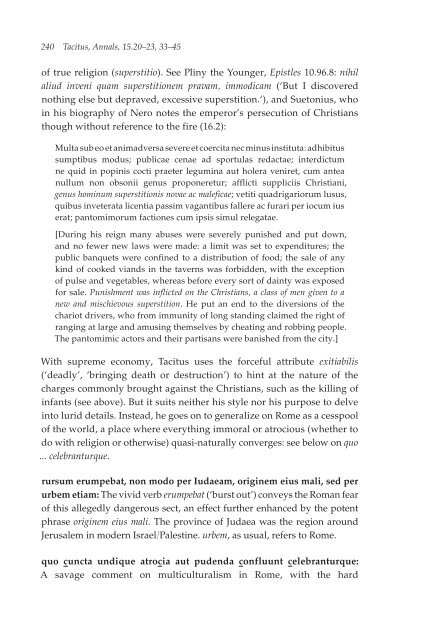Tacitus, Annals, 15.20-23, 33-45. Latin Text, Study Aids with Vocabulary, and Commentary, 2013a
Tacitus, Annals, 15.20-23, 33-45. Latin Text, Study Aids with Vocabulary, and Commentary, 2013a
Tacitus, Annals, 15.20-23, 33-45. Latin Text, Study Aids with Vocabulary, and Commentary, 2013a
You also want an ePaper? Increase the reach of your titles
YUMPU automatically turns print PDFs into web optimized ePapers that Google loves.
of true religion (superstitio). See Pliny the Younger, Epistles 10.96.8: nihil<br />
aliud inveni quam superstitionem pravam, immodicam (‘But I discovered<br />
nothing else but depraved, excessive superstition.‘), <strong>and</strong> Suetonius, who<br />
in his biography of Nero notes the emperor’s persecution of Christians<br />
though <strong>with</strong>out reference to the fire (16.2):<br />
Multa sub eo et animadversa severe et coercita nec minus instituta: adhibitus<br />
sumptibus modus; publicae cenae ad sportulas redactae; interdictum<br />
ne quid in popinis cocti praeter legumina aut holera veniret, cum antea<br />
nullum non obsonii genus proponeretur; afflicti suppliciis Christiani,<br />
genus hominum superstitionis novae ac maleficae; vetiti quadrigariorum lusus,<br />
quibus inveterata licentia passim vagantibus fallere ac furari per iocum ius<br />
erat; pantomimorum factiones cum ipsis simul relegatae.<br />
[During his reign many abuses were severely punished <strong>and</strong> put down,<br />
<strong>and</strong> no fewer new laws were made: a limit was set to expenditures; the<br />
public banquets were confined to a distribution of food; the sale of any<br />
kind of cooked vi<strong>and</strong>s in the taverns was forbidden, <strong>with</strong> the exception<br />
of pulse <strong>and</strong> vegetables, whereas before every sort of dainty was exposed<br />
for sale. Punishment was inflicted on the Christians, a class of men given to a<br />
new <strong>and</strong> mischievous superstition. He put an end to the diversions of the<br />
chariot drivers, who from immunity of long st<strong>and</strong>ing claimed the right of<br />
ranging at large <strong>and</strong> amusing themselves by cheating <strong>and</strong> robbing people.<br />
The pantomimic actors <strong>and</strong> their partisans were banished from the city.]<br />
With supreme economy, <strong>Tacitus</strong> uses the forceful attribute exitiabilis<br />
(‘deadly’, ‘bringing death or destruction’) to hint at the nature of the<br />
charges commonly brought against the Christians, such as the killing of<br />
infants (see above). But it suits neither his style nor his purpose to delve<br />
into lurid details. Instead, he goes on to generalize on Rome as a cesspool<br />
of the world, a place where everything immoral or atrocious (whether to<br />
do <strong>with</strong> religion or otherwise) quasi-naturally converges: see below on quo<br />
... celebranturque.<br />
rursum erumpebat, non modo per Iudaeam, originem eius mali, sed per<br />
The vivid verb erumpebat (‘burst out’) conveys the Roman fear<br />
of this allegedly dangerous sect, an effect further enhanced by the potent<br />
phrase originem eius mali. The province of Judaea was the region around<br />
Jerusalem in modern Israel/Palestine. urbem, as usual, refers to Rome.<br />
quo cuncta undique atrocia aut pudenda c c<br />
A savage comment on multiculturalism in Rome, <strong>with</strong> the hard


















